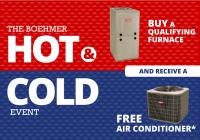 Efficiency is more than just a buzzword. When your heating and air conditioning (HVAC) systems are efficient, you know that they use a minimal amount of fuel or electricity, and you save more money in the long run. An efficient furnace or air conditioning system often costs more than one that is closer to the minimum federal rating, but that pays off in the long run.
Efficiency is more than just a buzzword. When your heating and air conditioning (HVAC) systems are efficient, you know that they use a minimal amount of fuel or electricity, and you save more money in the long run. An efficient furnace or air conditioning system often costs more than one that is closer to the minimum federal rating, but that pays off in the long run.
What you save often offsets the cost of a brand-new highly efficient air conditioning or heating system, and financing may be available from your local contractor. That’s why it’s so important to work with the pros, but we have some advice to get you started with picking out the most efficient system for your needs.
The Right Type of Heater and AC System
There is no perfect heating system or perfect air conditioner for every home. It will depend on whether or not your home is ducted, whether you have access to a natural gas line, and much more. Check out some of the options, any of which can be efficient in the right home.
- Boiler – Boilers are highly efficient, because there is little standby heat loss during the heating process. Radiant heating transfers heat directly to the people and objects in a room via hot water heating, while forced-air systems can lose some heat quickly to the air in a room. Still, that doesn’t make them best for every home.
- Gas Furnace – If you already have a duct system and access to natural gas, a furnace is usually the way to go. Installing a boiler and all its components can be costly, and likely not worth it if you’re replacing a central forced-air heater. Today’s furnaces are more efficient than ever before.
- Electric Furnace – In some parts of the country, an electric furnace is a sound alternative to gas heating as it is highly efficient and costs little to install. Those in cold climates, though, should keep in mind that generating heat with electricity can cost quite a bit.
- Heat Pump – A less costly way to use electricity for heating is with a heat pump. A heat pump is an air conditioner, first and foremost, but it also reverses, moving heat out of and into a home. Moving heat is a more efficient process than generating heat, after all.
- Central Air Conditioner – The classic central AC/furnace combination is still an excellent option, especially as central air conditioners gain more efficient components with each year.
- Ductless System – Finally, if you don’t have access to a duct system, a ductless heat pump allows you to have a central thermostat and multiple blower units for different rooms without sacrificing efficiency.
Understanding Efficiency Ratings
Once you know which system belongs in your home, it’s time to read into efficiency ratings, which should always be a more important factor than initial cost alone.
- AFUE – Furnaces and boilers use the annual fuel utilization efficiency to measure the amount of energy used towards heating a home. The AFUE is a percentage, and you want an AFUE of about 90 or above for more efficient heating. (Remember that while electric furnaces can have AFUEs near 100, this doesn’t necessarily result in savings in cold climates.)
- SEER – The Seasonal Energy Efficiency Ratio (SEER) is the best measure of cooling efficiency for an air conditioner, heat pump, or ductless system. While the minimum SEER installed in our area is 13, you should look for a SEER of 15 or higher for better efficiency.
- HSPF – This is the best measure of heating efficiency for a heat pump or ductless system. Look for a Heating Season Performance Factor of higher than 8.5.
Something else you should know is that even the most efficient system won’t work properly if it’s not the right size for your home. An experienced technician should be able to ensure this doesn’t happen, finding an HVAC system that is neither too small nor too large.
Get your HVAC system in Brentwood, PA by calling the team at Boehmer Heating & Cooling.


